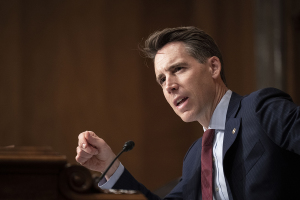Taking Down Left-Leaning Judges

Who has the most power in the country over political issues? Everyone focuses on the president and Congress when they talk about reforming the system and taking control back from the left, but they overlook the real powerbroker. Federal courts have been deciding the most contentious issues for years now, taking the final say away from both the president and Congress.
The final straw for many conservatives came recently with the Supreme Court's decisions on Obamacare and same-sex marriage. In response to this massive judicial power grab, the Empower the States project was launched, which aims to have Congress use its power under Article III, section 2 of the Constitution to remove jurisdiction from the federal courts over these kinds of issues. Instead, serious, controversial political decisions would be left up to the states and people where they belong.
The effort has begun gaining momentum in Arizona, where conservatives remain frustrated over a federal district court judge gutting most of SB1070, the state's tough anti-illegal immigration initiative that passed in 2010. Andrew Thomas, a former Maricopa County Attorney who was instrumental in getting SB1070 passed (who I worked for several years ago), is heading up the project with the Selous Foundation for Public Policy Research.
Over 100 conservative grassroots leaders in Arizona have already endorsed the project, including two past Arizona Republican Party chairmen, four past Maricopa County Republican Party chairmen, the state coordinator of Arizona's Tea Parties, and numerous elected GOP leaders at the state, county, district and precinct levels.
The courts were never intended to have all this power. Writing in The Federalist Papers, Alexander Hamilton said the courts were designed to be the "least dangerous" and "weakest" branch of government. Today, they are the exact opposite. In his white paper published by the Selous Foundation, titled "Overruling the Courts: How We End the Reign of Liberal Judges in 2016," Thomas observes, "Unelected federal judges, not elected officials, now have the final say on every national policy issue."
Part of the problem is federal judges are appointed, not elected, generally retaining their positions for life. They are accountable to no one — because of their power, even judicial ethics commissions are hesitant to interfere with them. Dominated by progressive judges, the federal bench has had free rein for years now to implement the left's agenda.
Thomas advises against other proposed solutions. An amendment to the Constitution would be extraordinarily difficult to get if not impossible. Legislation reversing bad court decisions would just end up back in court, where the judges would have final say. Trying to get conservative judges appointed to the bench is extremely difficult, as their nominations are held up and filibustered. The legal profession is overwhelmingly left-leaning due to years of indoctrination in law schools by progressive professors.
Under the Empower the States Act, jurisdiction would be taken back from the federal courts in four areas where they have committed the worst abuses: illegal immigration, same-sex marriage, abortion, and certain aspects of the death penalty. Legislation is already being drafted to tackle the first prong, the "Illegal Immigrant Trespass Act of 2015."
No longer subject to the whims of a handful of unelected, left-leaning judges, conservative states and clusters of like-minded states would form into "Faith and Freedom Networks." At the same time, the project calls to hold candidates for office and politicians accountable, insisting that they take a position on the project.
Most conservatives don't like to focus their efforts on the judiciary, because unless they are lawyers they find it too complex to delve into. Many lawyers and judges have an arrogant way of talking down to those outside of the legal profession, demeaning their critics for not having a law degree if they dare venture into their sacred territory. There is nothing mysterious or terribly difficult about becoming an attorney, almost anyone can go to law school.
Since conservatives are vastly outnumbered by progressives in the legal profession, conservative attorneys can't fight the battle alone; all conservatives must overcome their insecurities and the false arrogance of the left and tackle the legal system head on. Judicial decisions aren't some black and white, logically created product. All too often, they are whatever a particular judge wants to make of them, using whatever legal mumbo-jumbo after the fact to sound official. It is a clever method judges use to fool the people and disguise their tracks. These underhanded methods need to be exposed far and wide, building momentum for reform.
The Empower the States project is finally a realistic option for taking on the biggest political powerhouse in the country. Focusing on just Congress and the president lets the judiciary off the hook and allows it to continue deciding all of the most important political issues facing us today.



























